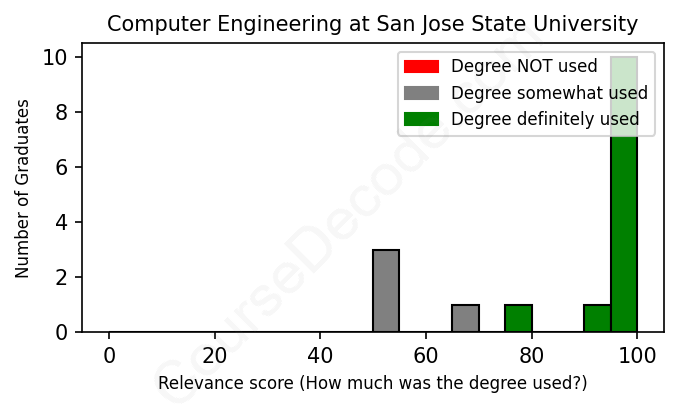
First, some facts. Of the Computer Engineering graduates from San Jose State University we've analyzed , here's how many have used (or NOT used) their degree in their career:

These are estimates based on AI analysis of 16 LinkedIn profiles (see below).
The verdict? Significantly above average. Overall, with an average relevance score of 85%, Computer Engineering graduates from San Jose State University have a much higher likelihood (+18%) of finding work in this field compared to the average graduate across all fields:
And for comparison, here's the chart for all profiles we've looked at across all degrees.
Also, after graduating, only 6% of these graduates have pursued further education other than another Bachelor's degree (such as a Masters degree or other), compared to the average across all profiles of 35%. This suggests a Bachelors degree is enough for most Computer Engineering graduates, and it's normal to look for work straight after graduation.
See the details:
|
Relevance score: 77% We think this person has gone into a career highly relevant to their degree. We think this person has gone into a career highly relevant to their degree.
DEGREE INFOGraduated in 2016 from San Jose State University with a Bachelor's Degree in Computer Engineering. No other secondary education since. JOB HISTORY SINCE GRADUATIONInstructor Student Assistant San Jose State University Jan 2016 - Dec 2016 Cybersecurity Intern  BAE Systems Jan 2017 - Apr 2017 Systems Engineer, Cybersecurity  BAE Systems Apr 2017 - Feb 2018 ABOUTNo information provided. |
The top 10 most common jobs done by the graduates we've analyzed (ranked most common to least) are:
When looking at the job experiences of San Jose State University graduates with a degree in Computer Engineering, it becomes pretty clear that the most common roles fall into the areas of software engineering, cybersecurity, and embedded systems. Many graduates have found positions as Software Engineers, often progressing from entry-level roles to more senior positions, indicating that companies value their technical skills and knowledge. Positions like Software Engineering Fellow, Software Developer, and Senior Software Engineer highlighted in the profiles demonstrate a strong reliance on programming, problem-solving, and systems design—all of which are core components of a Computer Engineering education.
However, not every job listed is directly aligned with the technical aspects of computer engineering. Some roles, like Instructor Student Assistant or Information Technology Intern, might touch on technical skills but often lean more toward support or administrative functions rather than applying engineering principles. That said, the majority of the roles observed tend to be relevant to the graduates' degree, particularly those in software development and cybersecurity, which align closely with the skills and knowledge acquired during their studies. Overall, while there are some outliers, many graduates are leveraging their Computer Engineering backgrounds effectively in their careers.
Here is a visual representation of the most common words in job titles for Computer Engineering graduates (this is across all Computer Engineering graduates we've analyzed, not just those who went to San Jose State University):

From the LinkedIn profiles analyzed, it looks like graduates from San Jose State University with a degree in Computer Engineering have generally gone on to have solid career trajectories, especially in tech-related fields. For many, the first jobs after graduation often include internships or entry-level positions in software engineering, cybersecurity, or systems engineering. For example, graduates from 2016 to 2020 typically transitioned from internships to roles like Software Engineer or Systems Engineer, quickly climbing the ladder to more advanced positions within reputable companies. This pattern indicates that most graduates are leveraging their degree effectively, landing roles directly related to Computer Engineering, which is a great sign for future students considering this path.
Looking a bit further down the line, five to ten years post-graduation, many of these alumni are found in more senior roles. For instance, several graduates who started as Software Engineers or Test Analysts progressed to Senior Software Engineer positions, or moved into specialized roles like Embedded Firmware Engineer, showcasing growth and advancement within the field. While not every single graduate seems to have hit the jackpot—some have taken more varied paths or are still figuring things out—it's clear that a solid chunk of them have found success in careers closely related to their field of study. Overall, it's encouraging to see that a Computer Engineering degree from SJSU can open doors to rewarding and relevant careers in the tech industry.
Getting a Bachelor’s degree in Computer Engineering can be pretty challenging, and at a school like San Jose State University, it’s no walk in the park either. You're diving into a lot of tough stuff like circuits, programming, and systems design, all of which can be pretty intense, especially if math and problem-solving aren’t your strong suits. The workload tends to be heavy, with lots of projects and labs that require both time and dedication. However, if you’re passionate about technology and are ready to put in the effort, you’ll find it rewarding. In comparison to other engineering degrees, it might be around the same level of difficulty, so it definitely requires commitment, but it's manageable if you're willing to work for it!
Most commonly, in the LinkedIn profiles we've looked at, it takes people 5 years to finish a Bachelor degree in Computer Engineering.
Looking at the job histories of these Computer Engineering grads from San Jose State University, it seems like many have found some solid opportunities that suggest they’re doing pretty well financially, especially those who started out as software engineers or in cybersecurity roles. For example, the 2017 grad who climbed the ranks at Applied Materials kicked off as a Software Engineer E1 and moved up to E2 Senior in just a few short years, which likely comes with a nice paycheck. Even the 2018 grad currently working as a Research Engineer seems to be in a decent spot, and given that tech salaries are often high in California, it’s a good bet that most of these folks are making decent money. However, some recent grads have taken on internships or lower-level positions, which might not be the same in terms of salary. Overall, though, it looks like a lot of them are on track to earn well as they progress in their careers.
Here is a visual representation of the most common words seen in the "about" section of LinkedIn profiles who have a Bachelor degree in Computer Engineering (this is across all Computer Engineering graduates we've analyzed, not just those who went to San Jose State University). This may or may not be useful:

Here are all colleges offering a Bachelor degree in Computer Engineering (ordered by the average relevance score of their Computer Engineering graduates, best to worst) where we have analyzed at least 10 of their graduates:
| College | Score | Count |
|---|---|---|
 University of Florida University of Florida
|
95 | 18 |
 Michigan State University Michigan State University
|
94 | 10 |
 Brigham Young University Brigham Young University
|
94 | 10 |
 Penn State University Penn State University
|
92 | 14 |
 California Polytechnic State University-San Luis Obispo California Polytechnic State University-San Luis Obispo
|
91 | 14 |
 University of Central Florida University of Central Florida
|
90 | 14 |
 Georgia Institute of Technology Georgia Institute of Technology
|
90 | 14 |
 Purdue University Purdue University
|
86 | 34 |
 University of Illinois at Urbana-Champaign University of Illinois at Urbana-Champaign
|
86 | 30 |
 Iowa State University Iowa State University
|
86 | 25 |
 Texas A&M University Texas A&M University
|
85 | 17 |
 San Jose State University San Jose State University
|
85 | 16 |
 Clemson University Clemson University
|
85 | 14 |
 Dwarkadas J. Sanghvi College of Engineering Dwarkadas J. Sanghvi College of Engineering
|
85 | 10 |
 North Dakota State University North Dakota State University
|
84 | 12 |
 Savitribai Phule Pune University Savitribai Phule Pune University
|
83 | 25 |
 University of Mumbai University of Mumbai
|
82 | 43 |
 New Jersey Institute of Technology New Jersey Institute of Technology
|
81 | 11 |
 University of North Carolina at Charlotte University of North Carolina at Charlotte
|
79 | 11 |
 California State Polytechnic University-Pomona California State Polytechnic University-Pomona
|
76 | 11 |
 The University of Texas at Dallas The University of Texas at Dallas
|
76 | 18 |
 University of South Florida University of South Florida
|
69 | 10 |
 Gujarat Technological University, Ahmedbabd Gujarat Technological University, Ahmedbabd
|
55 | 13 |